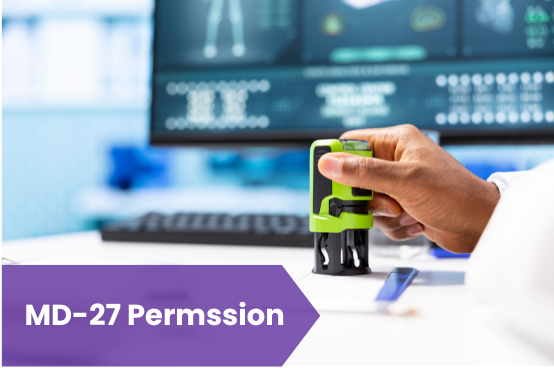Purpose
- MD-26 is the application form used to seek permission from the Central Licensing Authority (CLA) to import or manufacture a new medical device in India.
- “New” means a medical device that does not have a predicate device (a similar, existing device) in the Indian market.
When is MD-26 Used?
- Importing New Medical Devices: Companies seeking to import a medical device that lacks a predicate device in India must file the MD-26.
- Manufacturing New Medical Devices: Manufacturers in India developing a new medical device (without a predicate) also use the MD-26.
Key Sections of the MD-26 Form
The exact structure of the form may evolve, so always refer to the latest version on the CDSCO’s Sugam portal. Here’s a general outline of information it includes:
- Applicant Details:
- Company name, address, contact information.
- Manufacturing license details (if applicable).
- Device Information:
- Classification of the device (Class A, B, C, or D).
- Generic name and intended use of the device.
- Trade name or brand name of the device.
- Details of the manufacturer (country of origin, manufacturer’s address, legal manufacturer)
- Technical Specifications:
- Detailed description of the device.
- Composition and materials used
- Manufacturing process.
- Standards and testing information (e.g., ISO, IEC, BIS)
- Risk analysis report.
- Supporting Documentation:
- Performance evaluation reports and test reports (biocompatibility, stability, etc.).
- Clinical investigation report (if applicable).
- Labeling and user manual drafts.
- Free Sale Certificate or equivalent from the country of origin.
- Other required declarations depending on the nature of your product.
- Fees and Payment: Refer to the CDSCO fee structure.
Submission Process
- Sugam Portal: The form is filed through the Sugam online portal (https://cdscomdonline.gov.in). You’ll need to register an account.
- Supporting Documents: Prepare all documents meticulously. Clarity and organization expedite review.
Important Considerations
- Complex Process: Filling out the MD-26 form and gathering supporting documents can be an intricate process. Incorrect or incomplete information can lead to delays or rejection.
- Regulatory Consultant: For complex devices or if you’re new to the process, it’s highly advisable to engage a regulatory consultant who specializes in the Indian medical device market. They can significantly streamline the process.
- Official Resources: Always refer to the latest MD-26 form and guidance document on the CDSCO website (https://cdsco.gov.in/).
Understanding MD-27 Permission
- What it is: MD-27 is permission from the Central Licensing Authority (CLA) to import or manufacture a new medical device in India, meaning one that doesn’t have a predicate device available in the Indian market.
- Significance: It’s a critical step, often one of the first for bringing innovative medical devices into India.
Steps & Considerations
1. Pre-Application Preparation
- Understand your device:
- Thoroughly understand its classification (according to the Indian Medical Device Rules 2017) and potential risk category (Class A, B, C, or D).
- Higher risk class means more stringent requirements.
- Assess Novelty: Conduct a detailed search for predicate devices within the Indian market. A qualified regulatory consultant can help with this.
- No existing predicate device strengthens the case for the MD-27 pathway.
- Technical Documentation: Begin gathering and compiling comprehensive technical specifications, materials and manufacturing information, performance evaluation data, pre-clinical data, and, if relevant, any clinical data.
2. Clinical Investigation (If Required)
- Determination: Depending on your device’s risk profile, the CLA may mandate conducting a clinical investigation in India as part of the MD-27 application.
- Protocol & Approval: A detailed clinical investigation protocol must be designed and submitted for approval. (Form MD-22 is typically used)
- Ethics Committee: The investigation needs ethics committee approval.
- Data Compilation: Upon completion of the investigation, meticulous data collection, analysis, and a clinical investigation report must be generated.
3. MD-27 Application Preparation
- Sugam Online Portal: The CDSCO has streamlined this process through its Sugam online portal (https://cdscomdonline.gov.in). You’ll need to register and create an account.
- Form MD-26: Your application starts with Form MD-26. The level of detail required in this form is significant.
- Key Documents:
- Technical file with specifications, manufacturing processes, performance data.
- Detailed risk analysis of the device
- Test reports (biocompatibility, sterility, etc.)
- Clinical investigation report (if required)
- Labeling and user manual drafts
- Undertakings/Legal Declarations (vary depending on your situation)
- Fees: Review the CDSCO fee structure for the MD-27 process. Budget accordingly.
4. Application Submission & Review
- Form Submission: Meticulously review your application before submitting it with all supporting documents through the Sugam portal.
- Evaluation: The CLA will conduct a thorough review of your application. This can be a time-consuming process.
- Be prepared to answer additional queries and potentially provide further data or clarifications as needed.
5. Decision & MD-27 Issuance
- Approval: If the CLA is satisfied with the safety and performance demonstrated, it will issue the MD-27 permission.
- Rejection: If major gaps or deficiencies are found, the application may be rejected. You might have opportunities to address these points and re-apply.
Additional Considerations
- Complexity: The process complexity increases with the risk classification of your device.
- Timelines: CLA review times can vary, and the MD-27 process generally takes several months. Anticipate potential delays.
- Guidance: The CDSCO website has valuable resources, but their information can be complex.
Important Notes:
- Regulatory Consultants: Engaging a qualified regulatory consultant specializing in Indian medical device regulation is highly advisable. Their expertise can save you time and increase your success rate.
- Constant Updates: Regulations change. Stay updated with the latest information directly from the CDSCO website.

